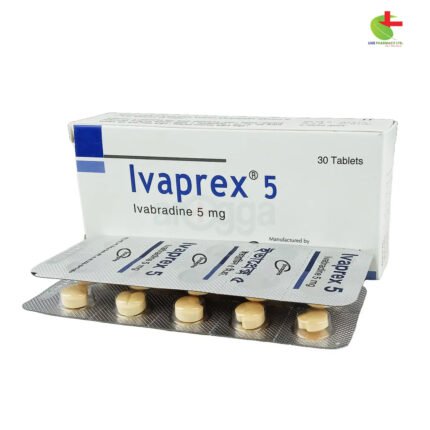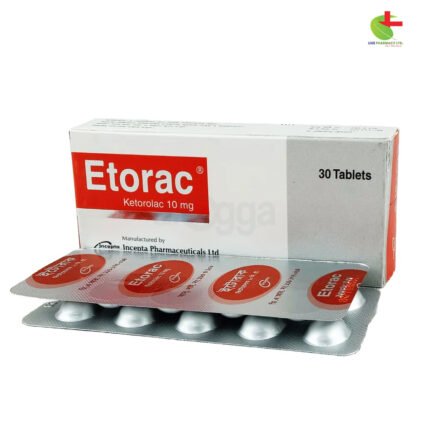Ivaprex 7.5
350.00৳ Strip
- Ivaprex is used to manage chronic stable angina pectoris in coronary artery disease patients.
- Effective for those who cannot tolerate beta-blockers or need additional heart rate control.
- Lowers heart rate without impacting myocardial contractility.
- Reduces cardiac workload, improving oxygen delivery to the heart.
- Always consult a healthcare professional before use.
 Brand
Brand
|
Incepta Pharmaceuticals Ltd |
|---|---|
 Generics
Generics
|
Ivabradine |
 Type
Type
|
Tablet |
Indications
Ivaprex is indicated for the symptomatic management of chronic stable angina pectoris in patients with coronary artery disease who maintain a normal sinus rhythm. It is particularly suitable for:
- Patients who cannot tolerate beta-blockers or have contraindications to their use.
- Patients inadequately controlled on an optimal dose of beta-blockers, with a resting heart rate exceeding 60 bpm.
Always consult a registered healthcare professional before using this medication.
Pharmacology
Ivabradine is a selective heart rate-lowering agent. It works by specifically inhibiting the cardiac pacemaker I_f current, which governs spontaneous diastolic depolarization in the sinus node, thereby regulating heart rate. By reducing heart rate, Ivabradine diminishes cardiac workload and oxygen consumption, while prolonging diastole to enhance coronary artery perfusion and oxygen delivery to the heart. Its effects are specific to the sinus node, with no impact on conduction times in the atria, ventricles, or myocardial contractility.
Dosage & Administration
- Adults: The typical starting dose is 5 mg taken twice daily, which may be increased to 7.5 mg twice daily after 3-4 weeks, based on therapeutic response. It is advised to take one tablet in the morning and one in the evening with meals. If the heart rate drops below 50 bpm or bradycardia symptoms arise, the dose should be reduced to 2.5 mg twice daily.
- Elderly: For patients aged 75 years or older, consider starting with a lower dose of 2.5 mg twice daily.
- Renal Insufficiency: No dosage adjustment is needed for patients with creatinine clearance above 15 ml/min; caution is advised below this level.
- Hepatic Impairment: No adjustment for mild hepatic impairment; however, caution is warranted for moderate impairment. Ivabradine is contraindicated in severe hepatic insufficiency.
- Children and Adolescents: Safety and efficacy in this group have not been established, so use is not recommended.
Always consult a registered healthcare professional before using this medication.
Interactions
Avoid concomitant use with QT-prolonging medications, both cardiovascular (e.g., amiodarone) and non-cardiovascular (e.g., pimozide). If necessary, close cardiac monitoring is essential.
Contraindications
Ivaprex should not be used in patients with:
- Hypersensitivity to Ivabradine or its components.
- Resting heart rate below 60 bpm prior to treatment.
- Cardiogenic shock, severe hypotension, sick sinus syndrome, or third-degree AV block.
- Severe hepatic insufficiency and certain drug interactions.
Side Effects
Common side effects may include visual disturbances, bradycardia, headaches, dizziness, and first-degree AV block.
Pregnancy & Lactation
Ivabradine is contraindicated during pregnancy and breastfeeding due to insufficient safety data and potential risks.
Precautions & Warnings
Use with caution in patients with mild to moderate hypotension, atrial fibrillation, congenital QT syndrome, or those on QT-prolonging drugs.
Therapeutic Class
Other anti-anginal and anti-ischemic medications.
Storage Conditions
Store below 30°C in a dry place, away from light. Keep out of reach of children.













Reviews
There are no reviews yet.